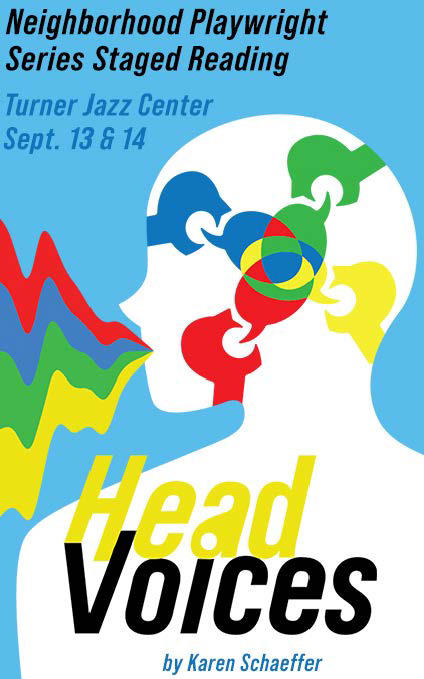
Karen Schaeffer’s play “Head Voices” chronicles one woman’s journey to self-healing and self-discovery after a dramatic life event. Photo courtesy of Erin Degner
A year and a half ago, when playwright Karen Schaeffer looked at herself in the mirror, she had an idea for a play about what she called her “head voices.”
“I know from my teenage years, from college, and even as an adult that these voices in your head can be pretty loud and sometimes very negative. And I thought, ‘That would be an interesting portrayal in a play.'”
From this idea was born “HEAD VOICES,” the winner of this year’s Drake Neighborhood Playwright Series – a playwright competition in which anyone can enter to win a staged reading of their work.
“HEAD VOICES” follows a woman whose inner voices and insecurities lead her to say “no” to marrying the man she loves. Through self-work, therapy, and self-love, she heals, and in time her inner voices quiet down and she brings him back into her life. Actors on stage will portray the voices during the staged reading.
The story continues below the ad
“Initially, the idea wasn’t fully fleshed out. I knew I wanted them to be together, and I wanted the audience to see how they were together, their relationship, and what kind of relationship they had,” Schaeffer said. “I wanted them to see it fall apart. And then I wanted the audience to see them go through the process of getting back together.”
Schaeffer wrote the play using a method she calls “what if.” She took her original idea and then asked herself what would happen if something new happened in the plot.
One thing Schaeffer had in mind when writing was having a female protagonist with complexity and story arcs. It was this fascination that sparked her interest in writing in the first place.
“I was looking at the different seasons of the different community theaters — the local community theaters — and I wasn’t really happy with the female characters I was seeing on stage. I wanted to see characters like myself,” Schaeffer said. “I wanted to see the women in my neighborhood, the women at the grocery store, the women I work with, things like that. And I thought, ‘Why aren’t there plays with women like that?'”
Schaeffer wants her female characters to be the focus of the story and to be “real.” For her, “real” is “situational and conversational,” meaning the situations and conversations are true to life. In “HEAD VOICES,” Schaeffer says, that realness is expressed in the friendship the main character has with another woman.
“I wanted this friendship relationship to be real (with) conversations you might have with a friend, especially when you’re struggling in a situation. I wanted this friend to be honest with the character, not just someone who placates them,” Schaeffer said.
Schaeffer also focused on authenticity in a therapy scene that takes place over Zoom, consulting with a therapist she knows while writing the scene. She incorporates this search for authenticity into every phase of the writing process.
“You have to be in places. You have to go to restaurants, cafes, parades and sit where people are because that’s where you hear conversations. That’s where you get ideas,” Schaeffer said.
Schaeffer didn’t write “HEAD VOICES” with the intention of submitting it to the Neighborhood Playwright Contest, although she knew as she was writing it that it would be a good fit because of its limited storyline, inclusion of characters college students can relate to and unique focus. Last year, she and her son, Alex Schaeffer, won with the play “PROLOGUE.” She said she enjoyed the workshop process of the competition, particularly the college atmosphere and the feedback from the actors.
“I think the energy of college students is refreshing. They’re very honest. Their ideas come from a place that’s different from people who have been out in the world for a long time,” Schaeffer said.
Erin Degner, associate professor of theater at Drake University, will direct the staged reading of “HEAD VOICES.” Staged readings do not require blocking, memorization of lines, and many of the technical elements of traditional plays or musicals.
“It’s about working on the characters and making sure a lot of the acting happens, yes, in their faces, but especially in their voices,” Degner said.
Students auditioned for the staged reading at the same time as the other theater performances on the weekend before the semester began. After that, professors cast all the roles for the semester. The cast for “HEAD VOICES” includes the main female character, her boyfriend, her girlfriend, and the main voices. The production process takes three weeks, with rehearsals taking place on weekday evenings.
“I’m always excited to bring new work to the stage,” Degner said. “It’s fun to present a work that no one has worked on before. The students aren’t role models. They can’t watch a video of another show. It’s brand new and we can make it our own.”
Performances will take place on September 13 and 14 at 7:30 p.m. at the Turner Jazz Center at the Harmon Fine Arts Center. Tickets are available online at https://www.tix.com/ticket-sales/drakefinearts/6865 or in person at the Drake Box Office at the entrance to the Fine Arts Center, by email at (email protected) or by phone at 515-271-3841.
